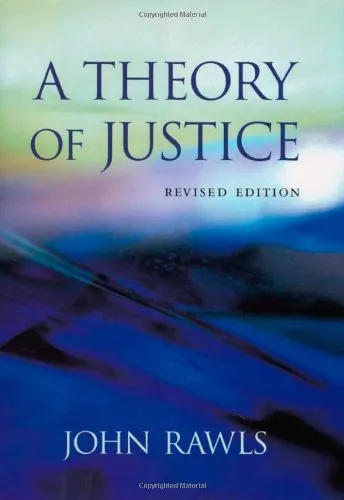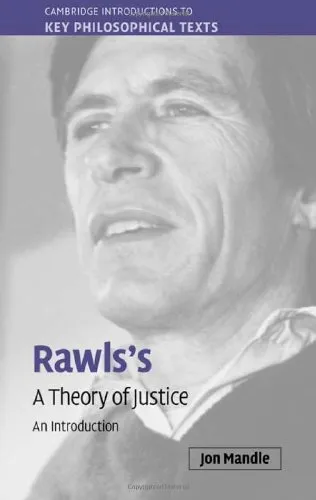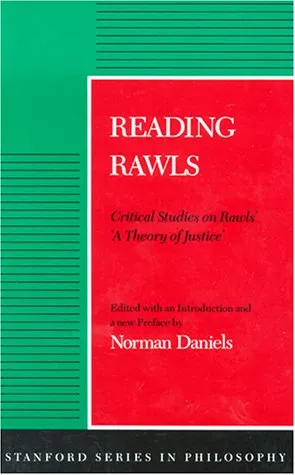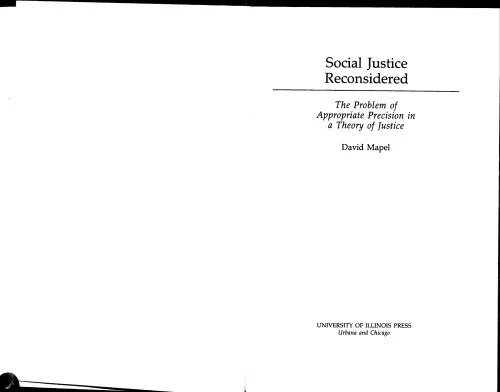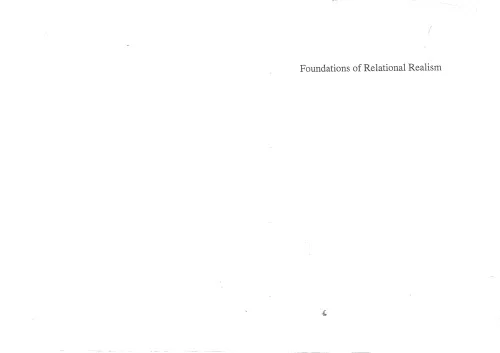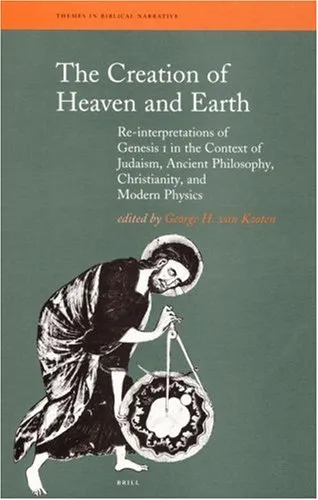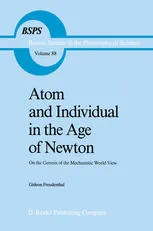A Theory of Justice: Revised Edition
5.0
بر اساس نظر کاربران

شما میتونید سوالاتتون در باره کتاب رو از هوش مصنوعیش بعد از ورود بپرسید
هر دانلود یا پرسش از هوش مصنوعی 2 امتیاز لازم دارد، برای بدست آوردن امتیاز رایگان، به صفحه ی راهنمای امتیازات سر بزنید و یک سری کار ارزشمند انجام بدینکتاب های مرتبط:
معرفی کتاب 'A Theory of Justice: Revised Edition'
کتاب 'A Theory of Justice' نوشته جان رالز، یکی از برجستهترین آثار در فلسفه سیاسی و نظریات عدالت در قرن بیستم محسوب میشود. این کتاب با ارائه نظریهای جامع و سیستماتیک درباره عدالت، مفاهیمی بنیادی برای مباحث سیاسی و اجتماعی معاصر فراهم کرده است.
خلاصه جامع کتاب
در این کتاب، رالز تلاش میکند تا اصولی را برای یک جامعه عادل و منصفانه معرفی کند. وی برای رسیدن به این هدف، مفاهیمی چون 'Justice as Fairness' و 'Original Position' و 'Veil of Ignorance' را معرفی میکند. به اعتقاد رالز، یک جامعه عادل بر اساس اصولی بنا میشود که در شرایطی منصفانه و بدون آگاهی از موقعیتهای خاص افراد، مورد توافق قرار میگیرند. از دیدگاه او، این اصول باید نابرابریها را به نفع کمبرخوردارترین افراد جامعه بهبود ببخشند.
نکات کلیدی
- اصل برابری: عدالت باید بر اساس برابری حقوق و فرصتها بنا شود.
- اصل تفاوت: نابرابریها را تنها در صورتی میتوان پذیرفت که به نفع کمبرخوردارترین افراد باشد.
- نقش آزادی: آزادیهای اساسی باید به گونهای باشد که هر فرد در جامعه بتواند آنها را به طور کامل و برابر بهرهمند شود.
جملات معروف از کتاب
“Justice is the first virtue of social institutions, as truth is of systems of thought.”
“Each person possesses an inviolability founded on justice that even the welfare of society as a whole cannot override.”
چرا این کتاب اهمیت دارد؟
این کتاب بهواسطه ارائه مدل نظری جدید برای عدالت و بررسی دقیق مفهوم عدالت اجتماعی، تأثیر عمیقی بر فیلسوفان، سیاستمداران و فعالان اجتماعی داشته است. نظریه عدالت به عنوان یک نقطه مرجع بنیادین در مباحثات و بررسیهای مربوط به سیاست و اجتماع اهمیت دارد. رالز با تلفیق اصول فلسفی و مسائل عملی، گفتمانی جدید ایجاد کرد که همچنان منبع ایدهها و الهامات بسیاری است.
Introduction to 'A Theory of Justice: Revised Edition'
In 'A Theory of Justice: Revised Edition,' John Rawls presents a groundbreaking vision of justice that has influenced political philosophy and ethical thought profoundly. First published in 1971, and revised in 1999, this book remains a seminal work that attempts to reconcile liberty and equality in a coherent model for a just society.
Detailed Summary of the Book
Rawls introduces the concept of "justice as fairness" as an alternative to utilitarianism, which was the prevailing philosophical framework at the time. The core idea is to establish a system of distributive justice that mitigates the inequalities resulting from the natural lottery of birth and social circumstances. In developing his theory, Rawls uses the thought experiment known as the "original position," a hypothetical situation where individuals decide on the rules of society behind a "veil of ignorance," not knowing their place in society, class status, or individual assets. This ensures fairness, as decisions are made without personal biases.
Rawls outlines two principles of justice: First is the principle of equal basic liberties for all citizens, such as freedom of speech and religion. The second principle, the difference principle, allows for social and economic inequalities only if they are of benefit to the least advantaged members of society. This reflects Rawls' belief in a stable system that rewards talent and effort while reducing the unfair advantages of birth and background.
Key Takeaways
Rawls' concepts have shaped modern political discourse and have been pivotal in discussions regarding human rights, social justice, and the function of political institutions. Key takeaways include:
- The Original Position and the Veil of Ignorance: These concepts help formulate unbiased principles of justice, providing a fair method to structure society.
- The Two Principles of Justice: Rawls emphasizes equal liberties and advocates for regulating inequalities to benefit all, especially the disadvantaged.
- A Rejection of Utilitarianism: Instead of maximizing overall happiness, Rawls argues for a system that respects individual rights and fairness.
- Justice as Fairness: The belief that a fair system of cooperation benefits all, accounting for moral and economic equilibria.
Famous Quotes from the Book
Rawls’ insightful ideas are captured in some memorable quotes:
"Justice is the first virtue of social institutions, as truth is of systems of thought."
"The principles of justice are chosen behind a veil of ignorance."
"Each person is to have an equal right to the most extensive total system of equal basic liberties compatible with a similar system of liberty for all."
Why This Book Matters
John Rawls' 'A Theory of Justice' matters because it provides a powerful, philosophically rigorous framework for evaluating social justice. It has profoundly impacted liberal political philosophy by proposing a fairer society where justice prevails through institutional arrangements that safeguard equality and freedom. Rawls challenges readers to consider not just personal moral judgements, but to evaluate societal structures as derivatives of agreed-upon, equitable principles. As societies globally grapple with issues such as inequality, discrimination, and the role of governmental influence, Rawls provides a lens through which these debates can be assessed, promoting reasoned dialogue over justice-related concerns.
In a world increasingly polarized by divergent ideals of fairness and equity, Rawls' vision of a just society continues to inspire scholars, policymakers, and activists seeking pathways to build a world founded upon justice as fairness. This book is not only an academic resource but also a beacon guiding efforts to conceive and realize just societal structures.
دانلود رایگان مستقیم
شما میتونید سوالاتتون در باره کتاب رو از هوش مصنوعیش بعد از ورود بپرسید
دسترسی به کتابها از طریق پلتفرمهای قانونی و کتابخانههای عمومی نه تنها از حقوق نویسندگان و ناشران حمایت میکند، بلکه به پایداری فرهنگ کتابخوانی نیز کمک میرساند. پیش از دانلود، لحظهای به بررسی این گزینهها فکر کنید.
این کتاب رو در پلتفرم های دیگه ببینید
WorldCat به شما کمک میکنه تا کتاب ها رو در کتابخانه های سراسر دنیا پیدا کنید
امتیازها، نظرات تخصصی و صحبت ها درباره کتاب را در Goodreads ببینید
کتابهای کمیاب یا دست دوم را در AbeBooks پیدا کنید و بخرید
1559
بازدید5.0
امتیاز1
نظر98%
رضایتنظرات:
5.0
بر اساس 1 نظر کاربران
hamid_reza7
23 دسامبر 2025، ساعت 9:39
یک کتاب ارزشمند در باب عدالت
Questions & Answers
Ask questions about this book or help others by answering
No questions yet. Be the first to ask!
